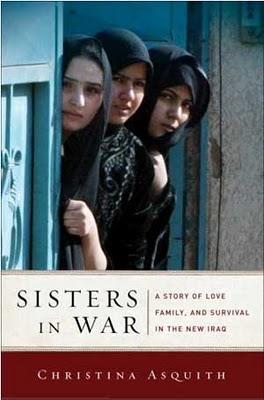Sisters in War: A Story of Love, Family, and Survival in the New Iraq

Sisters in War is a brilliant, convincing, and powerful story of three women from the same Iraqi Shia family: Zia is twenty-two years old, university educated, an outspoken and brave young woman when the story begins with the invasion of Iraq in 2001. Her younger sister, Nunu, a university student, is a quiet and traditional Muslim woman who hopes for an arranged marriage with a suitable man. Their Mamina, a schoolteacher, reminisces about the proud Iraqi tradition of equality for women in the 1950’s and 1960’s. She recalls the times of General Kassim who believed in equality, freedom and creativity for all: women, men and children alike. Since 1979, Mamina and her Ph.D. educated husband, Baba, have lived in Iraq under Saddam Hussein’s control.
The story of this Iraqi family is interwoven with the historical account of the events in Iraq during the American invasion as experienced by Heather and Manal. Heather was an idealistic and ambitious employee of the White House, whose office had already overseen $350 billion dollars in federal spending on national security programs when she understood that she could not overcome anti-American sentiment in Iraq from behind her desk in Washington, D.C. Manal was an educated, veiled woman in her twenties, an outspoken American aid worker who laced her powerful speeches in the United States with Muslim slang.
Both women traveled to Iraq where against all odds they became strong advocates for Iraqi women’s rights. They risked their own lives trying to help Iraqi women survive in their own country. They also founded the first women’s center in Baghdad.
These stories serve as a basic thread of Iraqi women’s lives, their hopes and dreams, and amongst them is Zia’s romance with Keith, an American contractor working in Baghdad. Zia supported her entire family working in the U.S. Headquarters as a translator from Arabic into English.
Zia and Nunu become the target of violent Iraqi militants. In a destroyed country, whose people experience the lack of every imaginable commodity, the dream of their liberation loses its significance. People are afraid to go out, women prone to abuse by any passing man yet unable to escape the restrictions of Iraqi society, are unable to continue their normal lives. Experiencing violence and harassment many of them fall into deep depression, giving up all their hopes and optimism for the future.
In spite of all the hardship, fear and death threats, the story has a happy ending. Zia manages to leave Iraq for Washington, D.C. in 2005, but her sister and Mamina have to stay in the horrifying, bloody city where suicide bombers kill hundreds of innocent civilians in every day attacks. Luckily, all three women are reunited at Sacramento International Airport in the summer of 2008 and Baba might be able to join them in the future. Zia’s love story is crowned by her marriage to Keith. Mamina, Zia, and Nunu are finally together and will share their lives together, hopefully in peace.
Christina Asquith, a journalist who spent two years in Baghdad working for The New York Times shortly after the start of the Iraq war, has written a sincere, thought-provoking, and timely account of the lives of Iraqi women from 2001 to 2009. This true story is engaging and very well written; in fact, I felt I was reading a novel rather than the non-fiction intimate description of the true events in Iraq. It is not only a story of women fighting for their liberated lifestyle. It is a story of Islamic traditions, religion, power, and politics versus American lifestyle, American power, and American beliefs.
In a subtle manner it recognizes the failure to understand, to want to understand the Muslim world by Americans and vice versa. Indeed, in her extraordinary book, Asquith filled in many pieces of the Iraq puzzle that needed to be deciphered.